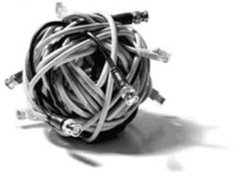About Students and Laptops

I watched conversations among my faculty colleagues rage about the banning of laptops in law school classrooms. They cussed and discussed why the Tennessee professor was right to ban laptops and how many other teachers in law schools they knew had also told their students to unplug and start engaging in the classroom. That disengagement and (of course) surfing the web and other distractions during class were the two main reasons professors gave for longing to ban laptops from the classroom.
So I asked my small class of students why students would be so upset at being told they had to unplug. There has to be something here we are missing. This is a very unscientific survey and a very small sample. I really don't want to ban laptops from my research class -- too key to what we are doing. But I was curious about the students' reaction, and the prof's comments, too.
I got several comments, and they ranged all over the place, not classifiable by age range. One of my older students, who went to college pre-PC commented that he can take down much more of what is said, without thinking about it, and then sort later by what is valuable. His college notes were drek, where his law school notes after editing are useful. That was a surprise. This guy also commented that some classes force you to engage, and others don't. A young man commented that he never saw attorneys taking notes from clients on laptops, and figured he was going to have to learn to take notes in some setting with pen and pad; he might as well get used to it in class. Begin being a lawyer now. That was an interesting take. Another younger student also preferred pen and paper, at least for some tasks.
I have been told that some software available on PCs not only record the class but also automatically make outlines as you create notes. Both these functions would make the students feel very vulnerable to be cut off. But they might also make the professors feel very vulnerable and feel the students were not doing the intellectual labor needed to really understand the class. There is also the point that "turning off the wireless" in a classroom is a very empty exercise. Wireless bleeds from room to room and anybody with a decent antenna can get a feed, and Apple users have vastly better antennae than others, apparently. Anybody with Bluetooth technology in their cellphone can switch to that and still get a feed if the wireless gets too weak.
So, get used to the students being connected. They know how to do it, or their friends know, which is the same thing. It's a wired world, now. We have to adapt. Much better to ask them what will make them more engaged in the classroom.
The awesome globe of wire to represent the wired world is from www.pi2.pl a Polish weblog called the PI2 Design Project. Thank you!
No comments:
Post a Comment